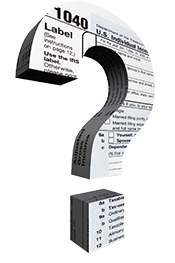 With the April 15 tax filing deadline right around the corner, here are answers to some common tax questions.
With the April 15 tax filing deadline right around the corner, here are answers to some common tax questions.
- When will I get my refund? The pandemic and additional stimulus payments will, in all probability, delay refund payments. But as of now here are the old wait times to receive your refund.
* E-file return with a direct deposit – 1 to 3 weeks
* E-file return with a mailed check – 1 month
* Paper file return with a direct deposit – 3 weeks
* Paper file return with a mailed check – 2 months
NOTE: If you want exact information on the status of YOUR refund go to www.irs.gov/refund and follow their instructions.
- What’s the most common delay in completing a tax return? Missing items! W-2 and 1099 forms are some of the most common tax documents to go missing. If you have multiple jobs, whether full-time or part-time, you’ll be getting multiple documents in the mail. It’s easy to lose track of all these documents if you don’t have one place you put them once received.
- Can I still get a stimulus payment? If you’re still waiting on either the 2020 or 2021 stimulus payment, file your 2020 tax return and claim the Recovery Rebate Credit. This is why it is important to keep track of any payments you receive from the government during the year. You will need them to account for any missing payments or underpayments.
- Can I correct a tax form that has an incorrect dollar amount? If you receive a tax document with incorrect information, contact the company that issued the document and try to get it fixed immediately. If you can’t get a corrected form right away, include both the incorrect form and the correct dollar amount when turning in your tax documents to have your return prepared.
- Can I deduct charitable contributions if I don’t itemize? In 2020 you can claim a $300 charitable contribution deduction regardless of whether or not you itemize your deductions. If you missed this window of this above-the-line donation in 2020, never fear as it is also available in 2021 with an increased limit to $600 for married couples. So, save those donation receipts!
- Is this taxable? While there are always exceptions, the most common taxable items that are questioned include unemployment benefits and withdrawals from non-Roth retirement accounts. Some things, like Social Security, are often, but not always, taxable.


 No one likes surprises from the IRS, but they do occasionally happen. Here are some examples of unpleasant tax situations you could find yourself in and what to do about them.
No one likes surprises from the IRS, but they do occasionally happen. Here are some examples of unpleasant tax situations you could find yourself in and what to do about them.